Life in the Empire
Customs
Calendar
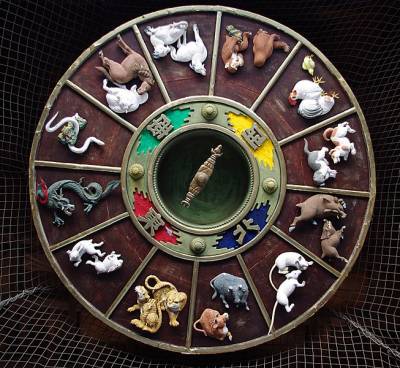 The game starts in the Year of the Rat. The next year will be the Year of the Ox.
The game starts in the Year of the Rat. The next year will be the Year of the Ox.
Time is a cycle and each year has its character; the animals of the zodiac encapsulate some elements both of the cycle and of the nature of the years and so it is that the years are named after them. The people of the Ankytherine Republic do not understand this, as they do not understand much else, and so they attempt to pin down the years with numbers like accountants and so show their fundamental ignorance of the nature of time.
Festivals
Every city and province in Ch'in has a dozen religious and commemorative festivals unique to it. But there are four festivals that are universal throughout the Middle Kingdom, and to attempt to prevent their celebration or hold any but prisoners from attending is to invite a year of the rankest bad luck.
New Years Day (Winter)
The most important of Chi'in festivals is held in the depths of winter and its most important element is the Reunion Dinner. Although travelling in winter is difficult every filial son and daughter should make the effort to return to their home for the great family dinner. Gifts are exchanged in red envelopes and a hot pot created from ingredients brought by each returning family member. It is good luck to clean the house from top to bottom to sweep away ill-fortune and make room for good. Windows and doors are decorated with red paper charms so that only good luck may enter.
Lantern Festival (Spring)
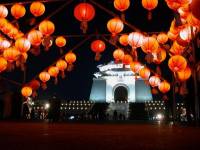 Every home in Chi'in has a stove god or kitchen goddess, a spirit of benevolence that watches over the kitchen at the heart of the home. On the night of the Lantern Festival across Chi'in every household god takes leave of their home and travels to Heaven to report upon the doings of the family. Paper lanterns are lit and sent soaring into the sky to light them upon their way. It is said to be very bad luck to cook upon the previous day while the household god is preparing the paperwork of their report.
Every home in Chi'in has a stove god or kitchen goddess, a spirit of benevolence that watches over the kitchen at the heart of the home. On the night of the Lantern Festival across Chi'in every household god takes leave of their home and travels to Heaven to report upon the doings of the family. Paper lanterns are lit and sent soaring into the sky to light them upon their way. It is said to be very bad luck to cook upon the previous day while the household god is preparing the paperwork of their report.
In Heaven itself the Celestial Bureaucracy works furiously to clear their desks for new reports. The gods are at their most capricious at this time as old sins and acts of virtues are unexpectedly discovered and punished or rewarded. Upon the Earth the Imperial Priesthood is at its busiest too as people throng the temples in order to have priests draw attention to their good deeds, or petition a friendly god to forget the bad. The most faithful (or generous) families host a priest on the night of the Lantern Festival and many operas rely on the priest still drunk from the Lantern Festival to marry their eloping couples.
Dragon Boat Festival
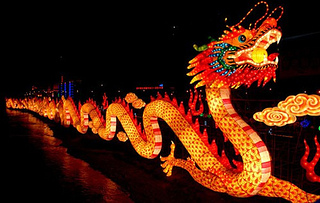 At mid-summer, when the sun is strongest and the rivers quiescent, is held the Dragon Boat Festival. Across Chi'in, in the morning rice balls wrapped in prayers are offered to the Dragon Kings that rule rain and sea by dropping them in streams and rivers. In the afternoon are held the great Dragon Boat races in which villages and neighbourhoods compete against one another to the rhythm of pounding drums for the chance of victory and a year of special favour from the local dragons. The evening is then a period of raucous drinking and partying without any of the solemnity of the other annual festivals.
At mid-summer, when the sun is strongest and the rivers quiescent, is held the Dragon Boat Festival. Across Chi'in, in the morning rice balls wrapped in prayers are offered to the Dragon Kings that rule rain and sea by dropping them in streams and rivers. In the afternoon are held the great Dragon Boat races in which villages and neighbourhoods compete against one another to the rhythm of pounding drums for the chance of victory and a year of special favour from the local dragons. The evening is then a period of raucous drinking and partying without any of the solemnity of the other annual festivals.
The Festival of the Dragon Boats is an especially propitious time for competitions of all kinds. For this reason the greatest and most prestigious martial arts festivals are held on this day. Once every twelve years it is the Year of the Dragon. Upon the day of the Dragon Boat Festival in the Year of the Dragon, the so-called Double Dragon, is held the greatest martial arts tournament of all. From across Chi'in monks and warriors and even a few of the famous hidden masters journey to the Imperial City to compete for the right to be considered supreme across Chi'in.
At game start it is approximately four turns until the next Double Dragon Festival.
Ghost Festival (Autumn)
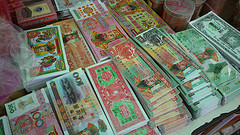 Held upon a new moon in late August when the nights are growing longer and the harvest is being gathered, it is said that on the night of the Ghost Festival the ghosts and spirits, including those of the honoured ancestors, may leave Hell and meet the living. Hell Money is burned and meals served to empty seats so that the honoured dead may have enough to live upon during the coming year. Families who neglect these rites risk turning their ancestors into hungry ghosts and surely cannot expect the protection of their ancestors. Noisy firecrackers are used to drive away less welcome spirits and a whole host of ancient rituals are handed down through the family to ward against evil but welcome friendly ancestors.
Held upon a new moon in late August when the nights are growing longer and the harvest is being gathered, it is said that on the night of the Ghost Festival the ghosts and spirits, including those of the honoured ancestors, may leave Hell and meet the living. Hell Money is burned and meals served to empty seats so that the honoured dead may have enough to live upon during the coming year. Families who neglect these rites risk turning their ancestors into hungry ghosts and surely cannot expect the protection of their ancestors. Noisy firecrackers are used to drive away less welcome spirits and a whole host of ancient rituals are handed down through the family to ward against evil but welcome friendly ancestors.
It is extremely dangerous to travel alone on the night of the Ghost Festival as murderous spirits that feast upon the living are abroad in the quiet places. Every sensible traveller therefore makes sure to have a fresh set of warding prayer trips lest they be unlucky enough to be delayed. Any priest will be happy to sell such before the Ghost Festival and it is one of the more profitable days for individual priests.
Knowledge
Imperial Examinations
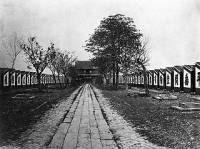 Each year in every prefecture throughout Chi'in, examinations are held for the ranks of the Imperial Bureaucracy. The current subjects examined are literature, mathematics, calligraphy and poetic composition and those that excel at these topics go on to govern the Empire as bureaucrats. By Imperial Decree anyone (or anything!) loyal to the Dragon Throne may sit and be examined. Many are the tales of goats or oxen that have wandered into examination halls and could not be shooed out till the chance to sit all the examinations had passed.
Each year in every prefecture throughout Chi'in, examinations are held for the ranks of the Imperial Bureaucracy. The current subjects examined are literature, mathematics, calligraphy and poetic composition and those that excel at these topics go on to govern the Empire as bureaucrats. By Imperial Decree anyone (or anything!) loyal to the Dragon Throne may sit and be examined. Many are the tales of goats or oxen that have wandered into examination halls and could not be shooed out till the chance to sit all the examinations had passed.
Prefectural examinations produce only the most junior of examinations and few are promoted from such junior ranks. The more ambitious must sit more difficult examinations at the capital or province, or for the very best at the Imperial Capital. The most prestigious rank of jinshi is only awarded to those who sit the examinations at the palace itself which are held every three years.
Examinations last between 24 and 72 hours, and are conducted in bare cubicles. These small rooms feature two boards which can be placed together to form a bed or placed on different levels to serve as a desk and chair. In order to ensure objectivity in evaluation, candidates are identified only by number, and examination answers are recopied by a third person before being evaluated to prevent the candidate's handwriting from being recognized.
Methods of Divination
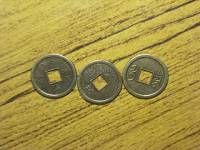 [There is no mechanical support for divination, the GMs will not give prophecies or predictions, but your character may wish to make use of one of these common techniques simply for roleplaying flavour.]
[There is no mechanical support for divination, the GMs will not give prophecies or predictions, but your character may wish to make use of one of these common techniques simply for roleplaying flavour.]
There are a great many different methods of divination in use in Chi'in. One popular method is known as the I Ching and requires a copy of the Book of Changes. One must use chance, guided by fate, to select one of the sixty-four oracular heptagrams for consideration. The oldest and most respected method is to toss yarrow stalks, but in this modern age few have the patience for such thorough divination. Instead many use three coins to prepare the heptagram. Toss the coins and count the number of tails: an odd number indicates yin - the broken line, whilst an even number indicates yang - the unbroken line. This must be repeated six times to produce the full heptagram.
For example a count of 2, 1, 2, 1, 3, 2 produces the heptagram Pi and indicates that there should be a free course in what is being asked, but there will be little advantage in taking the lead. Additional information may be be gleaned when one knows that the old yin and yang (indicated by 0 and 3) is changing and more powerful than the young. Thus we may see that since the fifth line is the only strong line (having shown three tails) that in ceremonies it is better to be sparing than extravagant. Only the wise may tease out the full meaning from these words.
The Medicine of Chi'in
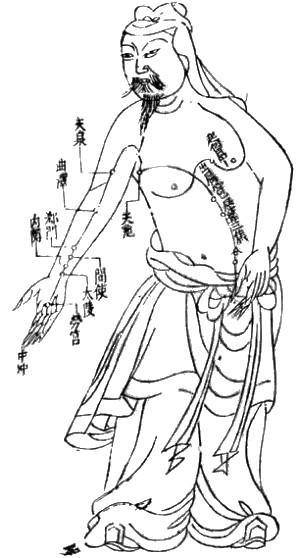 Within each body, whether of plant or animal or man, is a wellspring of chi. This chi flows through the body and circulates in a harmonious pattern. If the body is starved of chi, for example deprived of food or breath, it is weakened. If the body suffers from a surplus of chi it may cause fever or strange moods such as melancholy or fury, for the chi affects not just the body but the mind. Most diseases are caused by imbalances or blockages of the flow of chi, drunkenness by inflaming of the liver or headaches by the constriction of the channels of the neck. Even bad luck or inability to find love may be caused by imbalances of chi, and a doctor should be consulted in such cases too. Many methods may be used to cure such problems from herbs to the art of acupuncture, but all require the natural flow of chi within the body to be determined and the harmonious pattern to be restored.
Within each body, whether of plant or animal or man, is a wellspring of chi. This chi flows through the body and circulates in a harmonious pattern. If the body is starved of chi, for example deprived of food or breath, it is weakened. If the body suffers from a surplus of chi it may cause fever or strange moods such as melancholy or fury, for the chi affects not just the body but the mind. Most diseases are caused by imbalances or blockages of the flow of chi, drunkenness by inflaming of the liver or headaches by the constriction of the channels of the neck. Even bad luck or inability to find love may be caused by imbalances of chi, and a doctor should be consulted in such cases too. Many methods may be used to cure such problems from herbs to the art of acupuncture, but all require the natural flow of chi within the body to be determined and the harmonious pattern to be restored.
In the military, unfortunately, field surgery means that amputation is all too common. A soldier may die simply from the shock of so gross a rearrangement of her chi flow, and for many years afterwards the residual imbalances leave her at the mercy of unhealthy conditions. However, the wise doctor knows that the body eventually finds a new balance. Hence even illness may become normal and treatment of long-term conditions should never be left to the amateur.
